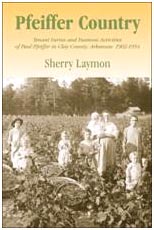Thank you for publishing your dissertation as a book. I found it fascinating since I have been working on a family history project for about three years now. Your book filled in a lot of the “reasons why.” The census records can give you names, dates, places and numbers: all facts, but they can not give you why someone moved or what they might have thought about while doing it. The stories that you tell and explain in your book about Paul Pfieffer dovetails, exactly with my family history, since my great-grandparents were Bynum Washington and Teula Wells. You’ve listed them on page 232 (of the hard cover printing) in the December, 1940 list of buyers, as B.W. and Teula Wells.
I have several family photographs, showing the interior and the exterior of the old farm house that they bought from Paul Pfeiffer. It looked just like the one you illustrated on page 95. The barn you illustrated on page 107 is still standing, although it is not in very good condition at this point. My grandfather’s brother inherited the farm, and they lived in the house until 1968 or so. Then they tore it down to build the new house. The barn and some of the other outbuildings are still there, though.
Gregory A. Crouch

